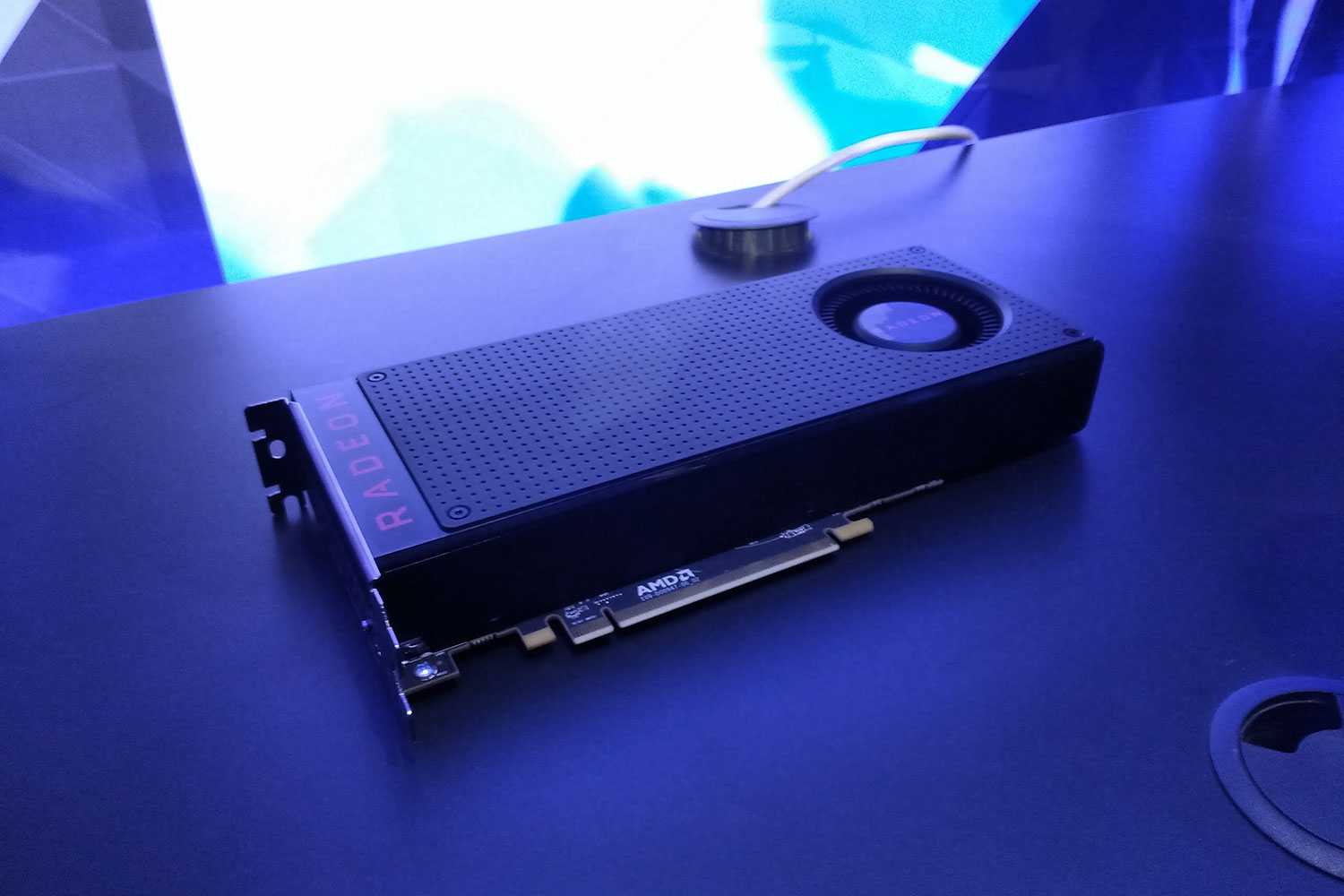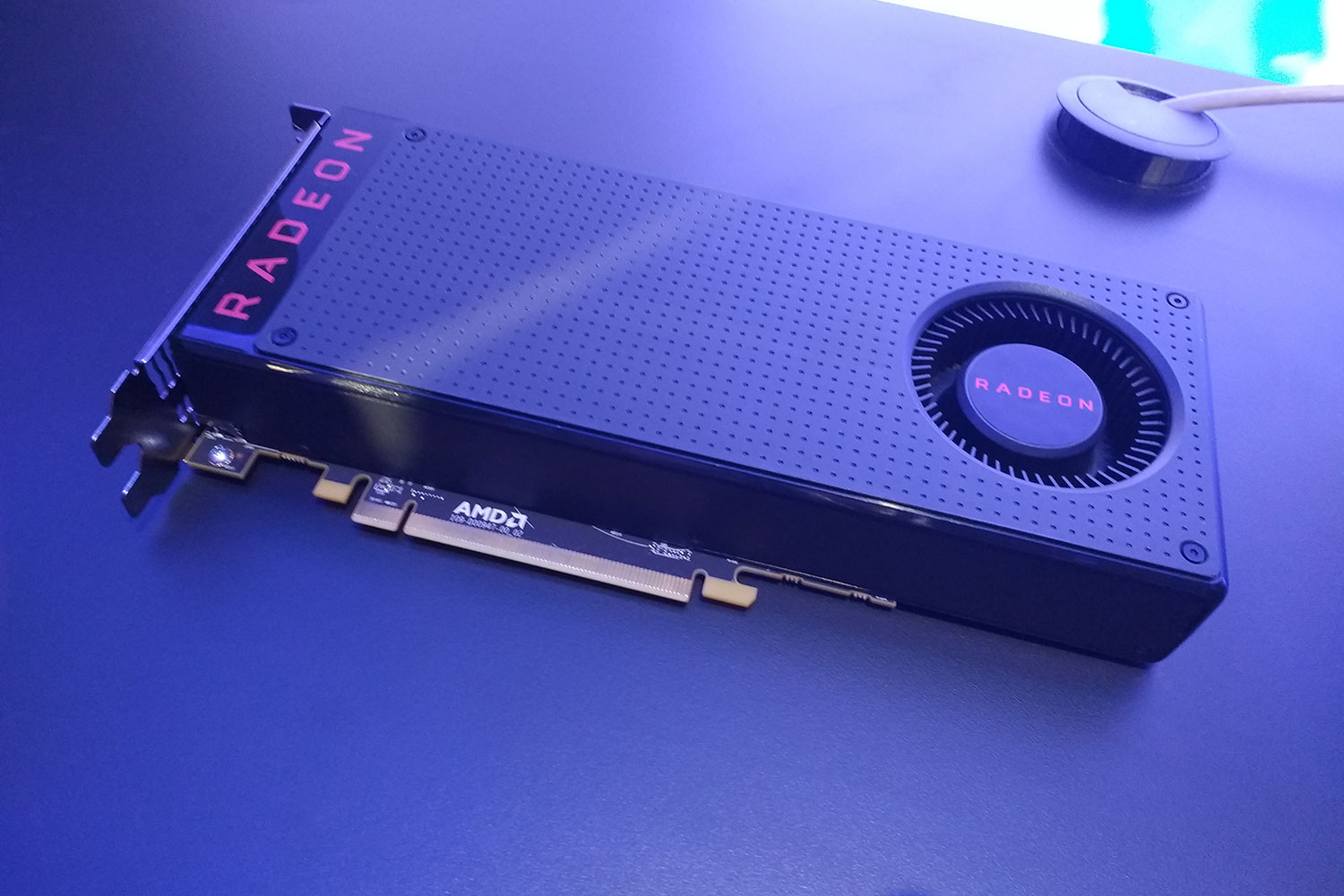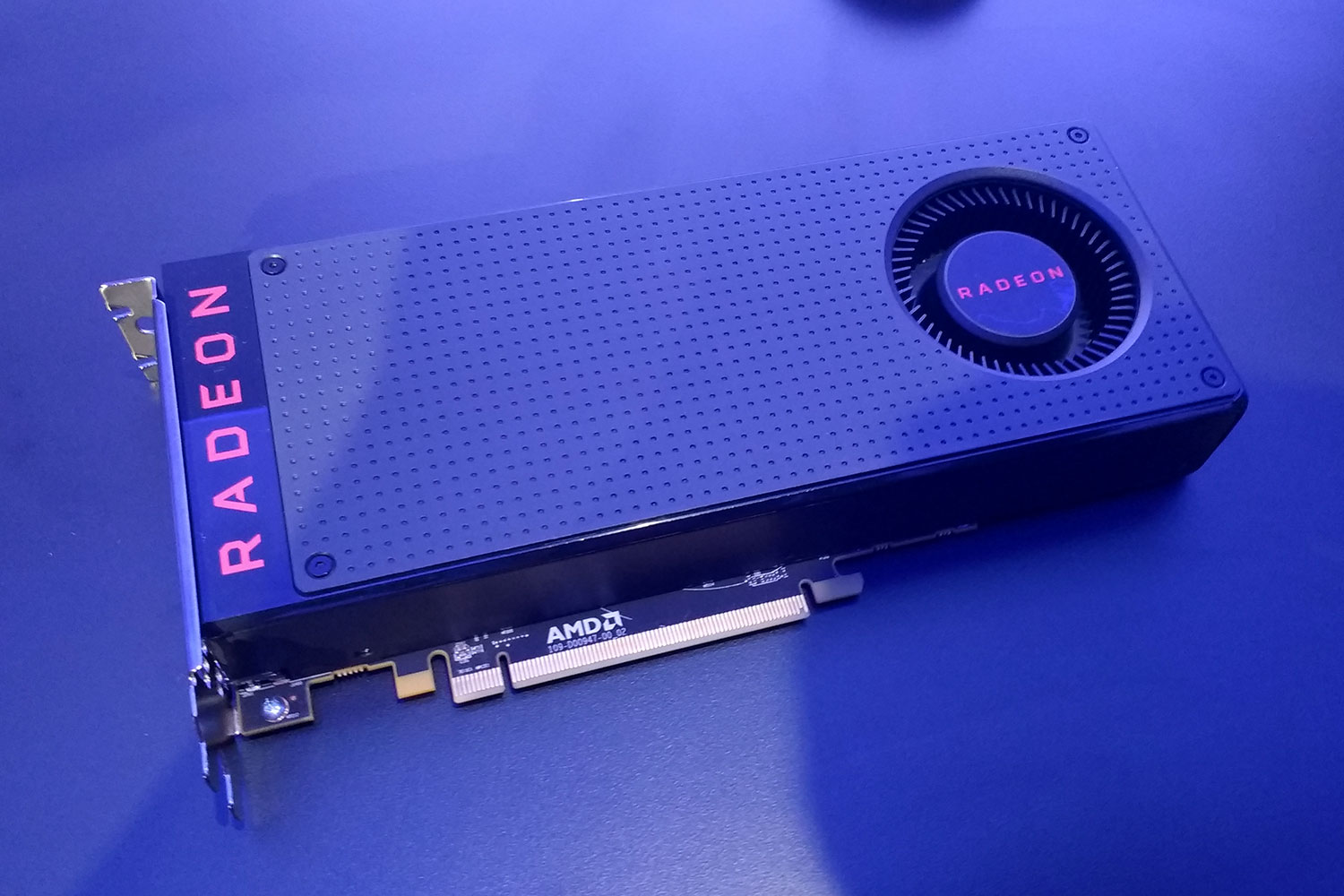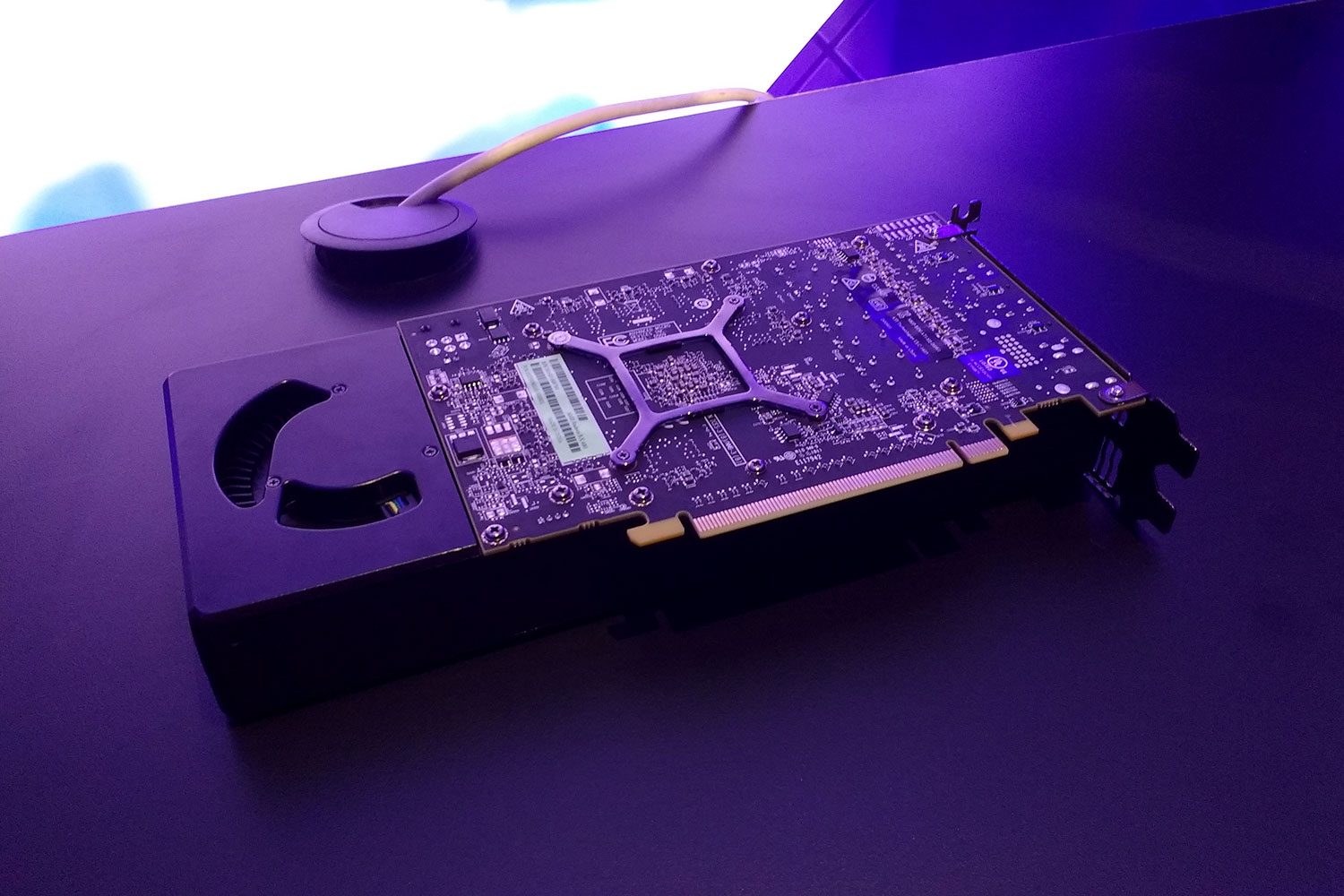
More than 20 presenters did just that, showing off a wealth of content for existing games, gameplay trailer reveals, and even some new hardware. A few developers even pushed out content updates and sneak previews.
The bling
First up, the new hardware. AMD showed off two new cards, the RX 470 and RX 460. While the $200 RX 480 the Red Team brought to Computex is targeted at budget-friendly VR, the purpose of the other two cards is slightly less clear. AMD CEO Lisa Su shared that the RX 470 is intended for impressive performance per watt, while the RX 460 is for eSports performance.
Curiously, Su showed off the RX 460 and 470 without any cooling or shroud at all. The RX 470 was a bare PCB with a typical double-wide port covering, while the 460 appeared with a small AMD fan positioned over the GPU. While AMD will certainly rely on third-party partners to produce cooling solutions, as it always has, it was interesting to see the chips without any reference design.
If you want to learn more about the Polaris platform, make sure to head over to our full breakdown, which provides more info on the architecture and feature set. Su made sure to mention Zen as well, with a short teaser claiming Doom was running on the new architecture. With Summit Ridge chips supposedly coming later this year, the Red Team is starting to near the final stages of feature compatibility and tuning.
It wasn’t all Radeon announcements, though, and a number of game developers also took the stage with news tucked under their arms.
Knights and castles
While video games span many different historical and future eras, there’s a rising tide of games like Chivalry: Medieval Warfare and Mount and Blade that focus on the medieval period. While the former is focused on combat, the latter is more of a feudal-era simulator. That’ll remain true with the prequel, Mount and Blade II: Bannerlord.
One of the more significant aspects of the game showed off by developer TaleWorlds was siege mode. Massive battles, with more 500 units between both sides, featured an attack on a castle with catapults, a battering ram being used to break down the gates, and hot oil dumped on players below.
Mount and Blade II is historically researched, and has political and trade components as well. The game truly refuses to sit in any one genre, with community manager Frank Elliot describing it as an “action RPG strategy simulation sandbox” game.
Big trees, bigger dinosaurs
Developers of the already popular ARK: Survival Evolved shared a wealth of new content on the way for the dinosaur-taming sandbox game. For one, a new biome is on the way — a redwood forest, with humongous, unharvestable trees that will act as the foundation of player-constructed tree forts.

The added verticality will certainly lend another element to an already complex game, but the new dinosaur may be even more influential. The titanosaur’s name reflects its massive, hulking body and long, rock-like structure. Like the redwood trees, the beast is indestructible, and through a special process, players can tame them, building structures on their backs and driving them around.
Mods are also a huge part of the ARK ecosystem, so much so that a few prominent mod creators have been brought on as developers. They’re working on a couple of projects, one of which expands the resource and creation options while taking away access to the high-tech tree. That means a heavier role-playing, community-building focus to the game.
There’s also the curious Primal Survival mod, which actually started as an April Fool’s joke by the developer. As it turns out, players really wanted to be able to play as the animals in ARK, and the mod was born. You’ll be able to play as anything from an ant to a shark, and live through a full life cycle, mating, raising and leveling up children, or just forming a gang of monkeys and throwing poop at passers-by.
Create a universe
In a similar vein, Dual Universe is seeking to blow the ideas of massive sandbox MMOs like Elite: Dangerous and Star Citizen wide open. Like No Man’s Sky, this game is built on a single universe.
Every structure is built by players, from a one-person spaceship to a massive station parked off-planet. The community will work together to build cities and colonize planets, form factions, and create politics. By allowing players to form a community in the coming months, they’ll be able to discuss causes and split apart.
It’s certainly an ambitious undertaking, but the pre-alpha trailer looks promising. The team is shooting for an early 2017 alpha.
Feast your eyes on more VR titles
Finally, there were a handful of virtual reality announcements at the event, mostly from the Oculus camp or developers producing for the Rift and Touch.
The much-anticipated Superhot VR made an appearance with a curious trailer that at first seemed to resemble what we’d seen from the game before. The end of a short gameplay segment took an odd turn when the headset “came off” in game, and a more realistic room with broken computers remained.
TripWire, the team behind gory first-person shooter Killing Floor 2, announced a virtual reality title — Killing Floor: Incursion. This VR game for Oculus Rift will pit players against waves of zombies and other creatures, in a series of scary-looking and bloody moments that are sure to have you screaming and jumping backwards.
On a more lighthearted note, there was new footage from Giant Cop, an HTC Vive game where, well, you’re a giant cop. You wander about the town solving mysteries, arresting criminals (or flicking them into the ocean), and picking up tiny thieves and carrying them to jail.
Only the tip of the iceberg
At the end of the presentation, Warren Spector, creator of legendary games like System Shock, Deus Ex, and a number of Ultima games, came up not to announce anything, but just to speak to the PC gaming community.
He spoke of the past, of developing Epic Mickey as a Wii exclusive, a decision he doesn’t regret. Even he couldn’t deny the appeal and power of the gaming console, but was sure to remind us “there are whole categories of games that play better on PC than anywhere else.”
Spector also spoke to the enthusiasm of the developers, and the passion of the teams bringing their hard work to the community. Part of that enthusiasm comes from the PC’s unique ability to upgrade and stay ahead of the curve, whereas “consoles depend on developers learning to exploit the same hardware more effectively next year.”
Instead, the PC’s inherently inclusive nature, hunger for performance, and passionate communities power a unique gaming experience. “Players benefit from the PC’s open-endedness,” Spector remarked. “Developers live for that.”







